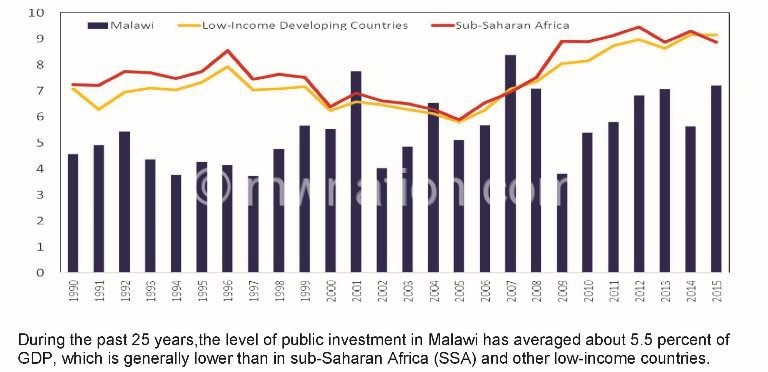Public investment under scrutiny
Malawi is lagging behind in the implementation of public investment compared to neighbouring countries in the southern Africa region, the International Monetary Fund (IMF) has said.
A recently released IMF technical assessment report on Public Investment and Management Assistance (Pima) measured the country’s performance on an index of the output of public investment compared to budget allocation.

The assessment found that Malawi has stronger institutions than its neighbours in the areas of infrastructure financing, and budgeting for investment but weaker in project appraisal, budget comprehensiveness, procurement, availability of funding, portfolio management and oversight, and project management.
“Malawi’s performance on other measures of public investment is relatively poor. The gap between planned and executed capital spending is higher than its neighbours, excluding Zimbabwe. Malawi’s public investment is also the most volatile in the region.
“During the past 25 years, the level of public investment in Malawi has averaged about 5.5 percent of gross domestic product [GDP], which is generally lower than in sub-Saharan Africa and other low-income countries averaging about 7 to 8 percent of GDP,” reads the report.
The report points out that the country’s Public Private Partnerships (PPPs) are currently insignificant with PPP capital stock at less than 0.1 percent of GDP, which is much lower than the average for sub-Saharan African countries at 4.2 percent and 7.3 percent of GDP for Malawi’s neighbours in the region.
Going forward, the reports says Malawi has an opportunity to perform better than its neighbours on key public investment management institutions over the next five years if authorities can build on the ongoing review of the Public Finance Management Act (PFMA), and better implementation and enforcement of the existing framework of laws, regulations, and procedures.
IM Swedish Development Partner Southern Africa regional director Dalitso Kubalasa said the high resource constraints, alongside lack of result-orientation and poor alignment of the available resources to priority sector programmes, projects and plans continue to aggravate the situation.
He said: “There is no thorough cost-benefit analysis for large or even small investment projects, no grounded results-orientation in public investment projects. The increasing trends of lacking transparency, accountability and integrity in the various public system processes, give rise to even more astounding lack or no effectiveness of the public sector institutions”.
A World Bank report released in May last also said the country’s infrastructure development is compounded by weaknesses in electricity access and public investment management.





